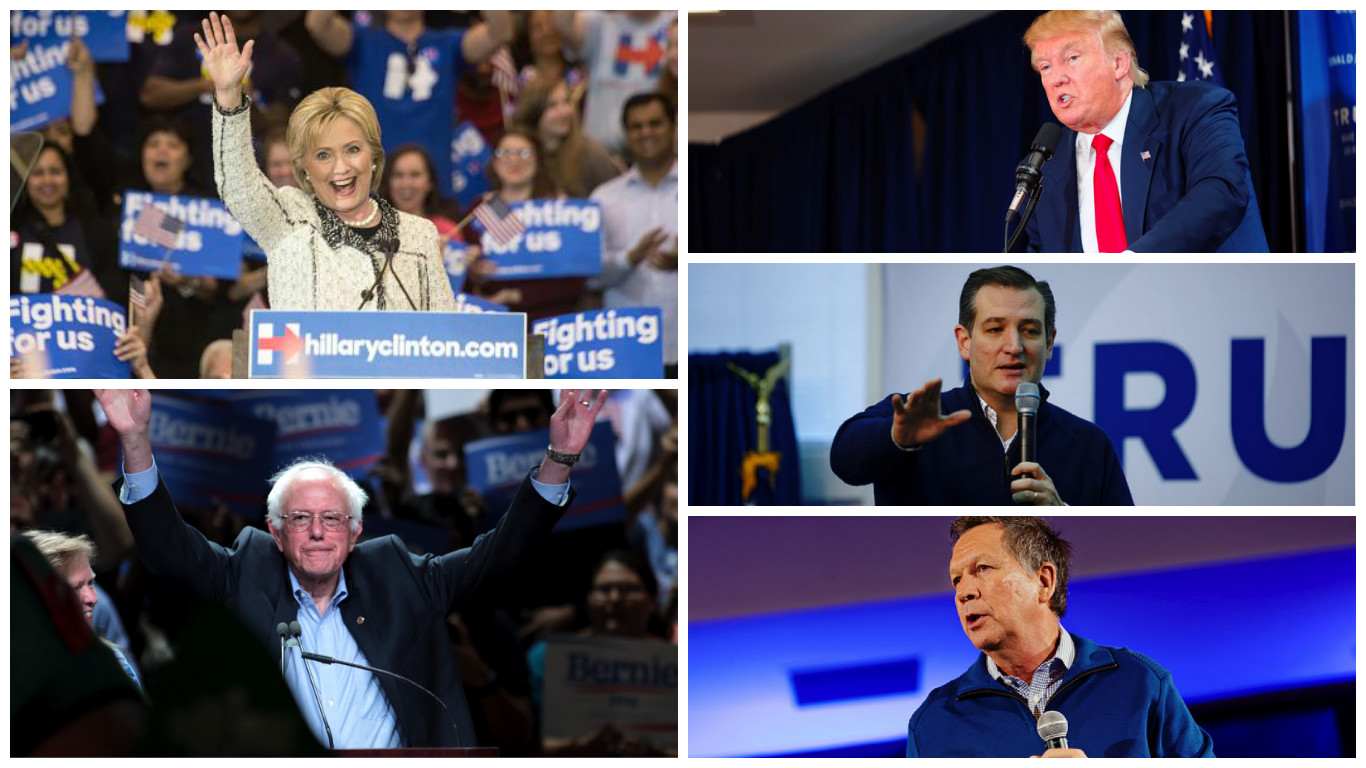As the United States Presidential Primaries begin to take shape, it is important to consider the possible implications that the results could have on Egypt and the Middle East.
Both of the major political parties in the United States— the Democrats and the Republicans— are each voting to select their respective candidates to run in the general election in November. It has now come down to two candidates on the Democratic side and three on the Republican side. The winner in November will determine the US policy in the Middle East for the next four years, at the very least.
For Egyptians, Hillary Clinton is widely considered to be the worst-case scenario with regards to the future of US-Egyptian relations. But is that belief justified?
Even though there is very little we as Egyptians can do to affect the narrative on the US political scene, it is critical to know the varying plans that these candidates have in store for our region.
Hillary Clinton (Democratic Candidate)

The first and perhaps most famous candidate of the bunch is Hillary Clinton. The former Secretary of State (equivalent of Foreign Minister in Egypt) has years of experience in international affairs and is an extremely unpopular figure in Egypt, due to her role throughout the 2011 revolution.
During the past few years, Clinton has been accused of being involved in countless conspiracies by the Egyptian media (including a deal with the Muslim Brotherhood (MB) to create ISIS), has had her motorcade pelted with tomatoes by protesters in Alexandria, and was also charged by an Egyptian court with conspiring with the MB to incite the revolution.
The MB itself openly accused Hillary Clinton of working with and protecting former President Hosni Mubarak during the 2011 uprising. In 2009, she said herself that she considered Mubarak and his wife, Suzanne, to be friends of her family. Ultimately, all of the major factions in the country distrust her for one reason or another, and publicly accuse each other of secretly working with her.
In reality, however, Clinton has had a very consistent policy on Egypt: She is willing to work with whoever is in power and whoever serves American interests the most – whether that is the military or the Muslim Brotherhood. As she explains in her memoir “Hard Choices,” Hillary had and continues to take a “realist” approach, as she did not see any other viable options for Egypt— as opposed to Obama, who believed in the possibility of democratizing the Middle East.
At first, she worked closely with Mubarak and opposed President Obama’s decision to pressure him to resign, because she believed it would lead to the MB taking over. When the Islamist group did reach power, she began working closely with its leadership and opposed its toppling a year later by the military. She explains this position in her book:
“There is little reason to believe that restored military rule will be any more sustainable than it was under Mubarak. To do so it will have to be more inclusive, more responsible for the needs of the people, and eventually, more democratic.”
On the ISIS front, Clinton has promised to follow in President Obama’s footsteps and continue the airstrike campaign in Iraq and Syria. In contrast to Egypt, she refuses to cooperate with Syria’s Bashar al Assad at all costs and aims to “defeat ISIS and Assad at the same time.” She is also a strong ally of Turkey and Saudi Arabia, the two countries that are most adamant in removing Assad from power. Similarly to Syria, Clinton encouraged the intervention in Libya to oust Muammar Gaddafi, a move that had fatal consequences on Egypt’s Western neighbor, which is now facing a civil war.
Clinton is also a strong supporter of Israel’s policies and, during her latest speech in front of the American Israel Public Affairs Committee (AIPAC), heavily criticized the Palestinian “terrorists” that are shooting rockets into Israeli territory, and defended Israel’s right to defend itself.
We can, therefore, comfortably presume that, if she were to win the presidency, Clinton would continue her past Middle East policy as President Obama’s Secretary of State. Even though she openly describes President Al-Sisi’s regime as a “military dictatorship,” she would almost definitely continue to work closely with Egypt on combatting ISIS, would continue to give the military the USD 1.3 billion in aid and will, in return, occasionally ask the Egyptian government to improve its human rights record, to introduce some minor social or economic reform, or even to help out in the battle against ISIS.
In other words, things will remain as they are under Obama, for better or for worse.
Bernie Sanders (Democratic Candidate)

Hillary’s opponent for the Democratic nomination is Bernie Sanders, the Democratic Socialist Senator from Vermont. After being written off by the media early on, he has had an incredible surge in the polls during the past six months and is now actually tied with Clinton nationally. His performance in the latest primaries also indicates that he has a real chance of winning the nomination.
Bernie has spoken relatively infrequently about the Middle East. He is generally considered to be one of the senators who are more critical of Israel’s settlement and military policies. He has also enjoyed large success in attracting American Muslims during the primaries, due to his strong emphasis on human rights and equality, and his commitment to allow more refugees into the country, albeit with proper screening.
He is also the only candidate from both parties who did not address the American Israel Public Affairs Committee’s (AIPAC) annual gathering, which provides an opportunity for candidates to court the pro-Israel vote. Sanders did, however, say that he will “work tirelessly to advance the cause of peace as a partner and as a friend to Israel,” while also noting that the US must also be a friend to Palestine for the peace process to move forward.
Sanders has opposed the United States’ invasion of Iraq, its intervention in Libya, and he opposes any type of future ground operations in Syria. He has progressive, non-interventionist policies and is against “regime-change” when it comes to foreign affairs.
He has called on the wealthy Gulf countries, including Saudi Arabia, to play a larger role in the “battle [against ISIS] for the soul of Islam” and he would likely not have the American military play a leading role if a serious coalition of Arab and Western countries were to be built to battle the terrorist group.
In contrast to Clinton, Sanders does not believe that the toppling of Assad would bring any positive results, and, for now, would rather have the US military focus its efforts on combating ISIS.
It can be inferred from his domestic policies that Sanders would possibly place greater reform requirements on the Egyptian government in return for the US aid. There is even the possibility that he would cut off aid altogether, as he has fought for human rights and civil liberties his entire career and might demand serious social reform from the recipients of US taxpayers’ money. However, that is somewhat unlikely, due to the significant role the Egyptian military, America’s second biggest ally in the region, is projected to play in the battle against ISIS during the next few years.
We can therefore assume that relatively little would change from the current situation, even if Sanders were to win the general election, but that America’s involvement in the Middle East would probably decrease, both militarily and politically. Humanitarian aid, on the other hand, could possibly increase.
Donald Trump (Republican Candidate)

The first candidate on the Republican side is the infamous Donald Trump, who is currently leading the Republican delegate count and has, surprisingly, been fairly consistent with his views on Egypt.
Trump opposed the Egyptian revolution from the beginning, criticizing Obama’s decision to “abandon” Mubarak during the 2011 protest and later condemning Morsi’s visit to the US. He has heaped praise on military leaders, like Putin, in the past, and would likely be a strong ally to Al-Sisi. He has little interest in democratizing the Middle East and, based on his own statements, his policies would likely be geared solely to the benefit of the US, with minimal regard to human rights and social reform in the region.

A large part of Trump’s campaign is based on his vow to “crush” and “destroy” ISIS. One of the policies he has promised to implement in order to stop them from “infiltrating” the US is to temporarily ban all Muslims from entering the country. He has also promised to create a database of all Muslims living in America, to bring back different types of torture, to murder terrorists’ families and even to invade Iraq (again) and Syria and “take their oil”.
Trump’s position on the Israeli-Palestinian conflict has generally been pro-Israel, despite various contradictory statements. He said he would prefer to remain “neutral” on the issue for now, in order to hold a stronger position during the talks, but later said that he will take Israel’s side in future negotiations. He has also often repeated his “closeness to Judaism” when speaking of Israel, and declared that he would be a “good friend to Israel”. His position on foreign aid is also not clear, but he has hinted that the US should stop supporting countries that “hate” America.
Obviously, Trump would be a risky option for Egypt and the Middle East but, in truth, it is almost impossible to predict what a Trump presidency would look like or if he is even being serious with his campaign promises. After all, he admitted himself that he gets most of his foreign policy advice “from the shows”.
It would certainly be entertaining to watch but it is difficult to imagine how Trump would build a strong relationship with Egypt, while banning the great majority of its people from entering the US.
Ted Cruz (Republican Candidate)

Ted Cruz, Trump’s main rival for the nomination, has a far more consistent right-wing line of thinking when it comes to the Middle East.
When asked during one of the Republican presidential debates what it would take to destroy ISIS, the first-time Texas Senator responded, “We need a president that shows the courage that Egypt’s President Al-Sisi did, a Muslim, when he called out the radical Islamic terrorists who are threatening the world.”
Earlier this year, Cruz reiterated this respect for President Al-Sisi, saying: “Let me give you an example of a Muslim for example, we ought to be standing with: President Al-Sisi of Egypt, a president of a Muslim country, who is targeting radical Islamic terrorists.”
Despite this support, however, he encouraged the US’ decision to suspend military aid to Egypt, after the Egyptian security forces raided Rabaa al-Adawiya Square in August 2013 and believes that the US should have pressured the military to move towards democratic reforms. Still, Cruz maintains his support for Al-Sisi, whom he believes will be more inclined to continue civil reforms “if he were confident in US support”. He has introduced a bill to Congress that would officially designate the MB as a terrorist organization.
Cruz has vowed to adopt a heavy-handed approach in his battle against ISIS. When Donald Trump suggested the idea of banning Muslims from entering the US, Cruz refused to criticize the policy and claimed that he “understood why Trump made that proposal”. He also agrees with Trump on bringing back waterboarding.
In Iraq and Syria, he aims to intensify airstrikes against ISIS, while increasingly arming the Arab allies in the region. Somewhat disturbingly, Cruz has also vowed to “carpet-bomb” locations in the two counties.
Carpet-bombing is a type of large aerial bombing, in which large numbers of bombs are dropped progressively so as to cause uniform devastation over a given area. The goal of carpet-bombing is usually to level entire cities and to destroy civilian populations. It was commonly used during World War II to demolish entire cities, most famously Dresden, Hamburg and Tokyo.
He claims that this strategy would destroy ISIS but most military experts have disagreed. Christopher Harmer, a senior naval analyst at the Institute for the Study of War, explains that “you have to be deliberately ignorant of the nature of ISIS … [and] of the limits of air power to advocate carpet bombing.”
Carpet-bombing in Iraq and Syria could actually end up helping ISIS, as it plays into their narrative that the West is at war with Islam, rather than ISIS. If American bombs kill innocent civilians, ISIS would definitely use that move to lure in new recruits.
Ted Cruz also believes that the Middle East was more secure when Saddam Hussein and Muammar Gaddafi were still power and is against regime change, especially when it concerns friends of the US.
Cruz consistently sells himself as a very strong supporter of Israel and its government. He demonizes anyone who opposes the Israeli state’s policies and was recently booed off the stage when he voiced his unwavering support for Israel at a conference attended by Middle Eastern Christians, whom he assumed would appreciate his statements (despite many of them being of Palestinian Christian origin).
Finally, it is important to point out that Cruz recently hired a new national security adviser, who is described by the Southern Poverty Law Center as “one of America’s most notorious Islamophobes.” This man is Frank Gaffney, a former member of the Ronald Reagan-era Defense Department, who is notorious for his conspiracy theories revolving around the idea that Muslims are destroying the West from within. He made headlines when he declared that President Obama used to be a Muslim, and may still be one, and repeatedly claims that the Muslim Brotherhood has infiltrated the US government and White House.
Even though Ted Cruz would likely improve American-Egyptian relations on the governmental level, it is also probable that America’s popularity among the people of Egypt and of the region will continue to decline. Cruz thrives on divisive politics and he is considered one of the most divisive US senators. Division is the last thing this region needs.
John Kasich (Republican Candidate)

The final Republican candidate, and the least likely to clinch the nomination, is the governor of Ohio, John Kasich.
Kasich has repeatedly asserted the need to work with regional allies to battle ISIS, including “boots on the ground” in Iraq, Syria and even Libya.
On his website, he has outlined the importance of aiding Egypt in its conflicts in the Sinai and on the border with Libya. He is willing to let the “regional powers [in the Middle East] redraw the map” after wiping out ISIS.
Late last year, Kasich called for the creation of a new agency “that has a clear mandate to promote the core, Judeo-Christian Western values that America and its friends and allies share…” This agency would target Russia, China and the Middle East and would serve the same purpose as the US’ propaganda campaigns during the Cold War.
Kasich has criticized President Obama’s relationship with Israel and has defended the country’s stance on settlements and peace with Palestine. He does not believe in permanent peace in the Middle East and instead only supports the idea of “stability” in the region. He is also against any two-state solution, until the Palestinians “recognize the State of Israel, guarantee their permanent security, stop launching Katyusha rockets into Israel, stop sending in people with knives to kill people in Israel… and knock it off”.
John Kasich is the only Republican candidate who would not immediately revoke the Iran Deal that was reached last year, even though he does still oppose it.
When President Obama visited Egypt in 2009 and made his historical speech at the Cairo Opera House, he was widely considered by Egyptians, and even Americans, to be a bringer of peace, change and stability, and a president who would vastly improve America’s relationship with the Muslim World.
Instead, the region has experienced unforeseen instability, civil wars and the rise of an apocalyptic power that wants to destroy civilization. Never before has the there been such tension between the West and the Arab World.
It is impossible to predict how a future president will act and it is also unfair to lay the full blame on President Obama for the mess we find ourselves in now. But it is important to keep an eye on these five candidates for president, as they throw around promises to the American people that can and will affect our lives as Egyptians.






Comments (0)